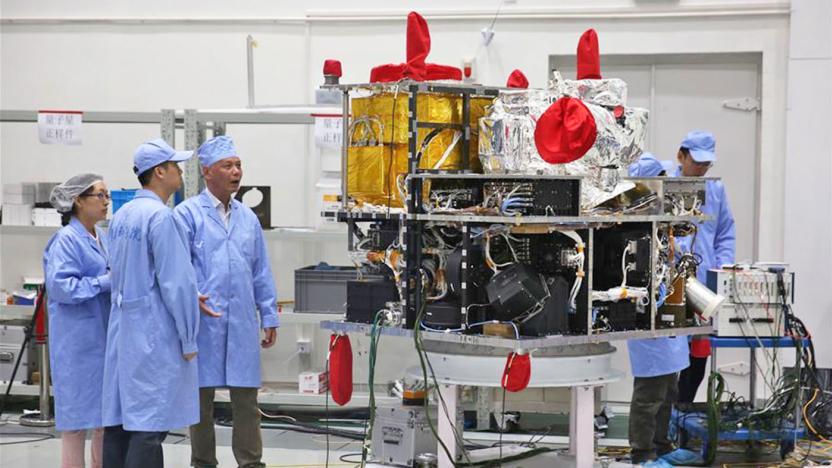QuantumCommunications
Latest

Chinese satellite to test secure quantum communications
China is set to launch a satellite that could form part of an unassailable, worldwide communications network. The 600 kg (1,300 pound) QUESS craft, launching sometime in August, will perform the first ever quantum experiments in space. A special crystal onboard will generate pairs of "entangled" photons that will be fired at labs in China and Austria. Ground based teams will then perform tests to see if the photons remain bonded even when 1,200 km (700 miles) apart.

Scientists eye secure communications by slowing down light
We've already seen what fiber optics can do for internet speeds, and it looks like the medium could be used for quantum communications too. See, as EurekAlert tells it, scientists from the Vienna University of Technology have figured out a way to modify the material so it can be used to control the speed of light. The researchers successfully grafted cesium atoms to the fibers, allowing them to slow light down from its typical 671 million MPH pace to around 112 MPH (180 KPH). The researchers were able to bring the light to a complete stop and then restart it later, too -- something EurekAlert says in a pretty major step toward quantum internet. It'd be much more secure than what we have currently as well, given that professor Arno Rauschenbeutel says that quantum physics at its very core allows for a connection between sender and receiver and anyone tapping in won't go unnoticed. [Image credit: Shutterstock]

Quantum entanglement could mean completely secure data transfer
By tapping into Albert Einstein's idea of "spooky action at a distance," researchers at the University of Copenhagen's Niels Bohr Institute have discovered what might be the key to completely secure data transfer -- keeping particles "entangled" for up to an hour. Until now, the link between two entangled systems could only be maintained for a fraction of a second. This development could enable a direct link between two systems of communication -- you do something to one and the other will "know." Although limited to the lab right now, scientists are working on practical applications for networking and the internets. Hey, SSH maybe it's time you started watching your back. Check out the full PR after the break. [Thanks Nan]

Northwestern University researchers route photon qubit, make quantum internet possible
Big brains across the globe continue to unlock the secrets of the qubit and harness it for myriad uses -- quantum hard drives, quantum computers, and even quantum refrigerators. The internet may be next in line to get quantum-ized now that researchers from Northwestern University found a way to route a photon qubit through an optical cable without losing any of its physical characteristics. A newly developed optical switch does the deed, which allows fiber-optic cables to share multiple users' quantum info at once -- making superfast all-optical quantum communication networks possible -- and gets us closer to having our tweets and status updates whizzing to and fro at the speed of light. [Thanks, Jonathan C]

All-optical quantum communication networks nearly realized, 'Answers to Life' airing at 9PM
Ready to get swept away into the wild, wild abyss known as quantum computing? If not, we're certain there's a less mentally taxing post above or below, but for those who answered the call, researchers at the University of California Santa Cruz have a doozie to share. A team of whiz kids at the institution have developed a minuscule optical device that's built into a silicon chip, and it's capable of reducing the speed of light by a factor of 1,200. If you're wondering why on Earth humans would be interested in doing such a thing, here's the long and short of it: the ability to control light pulses on an integrated chip-based platform "is a major step toward the realization of all-optical quantum communication networks, with potentially vast improvements in ultra-low-power performance." Today, data transmitted along optical fibers must still eventually be converted to electronic signals before they're finally understood, but the promise of an all-optical data processing system could obviously reduce inefficiencies and create communication networks that are far quicker and more robust. There's still no telling how far we are from this becoming a reality -- after all, we've been hearing similar since at least 2006 -- but at least these folks seem to be onto something good... even if it's all too familiar.




